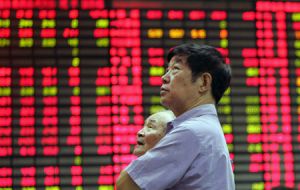MercoPress. South Atlantic News Agency
World markets results tied to outcome of US bail out plan

Shares in Asia opened on Tuesday lower amid uncertainty about the impact of the massive US financial bail-out plan. The falls followed a sharp slide in the US, where the Bush administration has been discussing the 700 billion rescue plan with Congress.
The White House says Congress must back the proposed bail-out to prevent wider economic harm. But doubts over the speed at which it can be introduced have emerged from both Democrats and Republicans. Many politicians appear alarmed by the scale and implications of the global financial crisis. While most are anxious to find bi-partisan ways of getting behind the bail-out, others are critical of what they see as a waste of taxpayers' money, correspondents say. In the US on Monday, the Dow Jones index closed 372.75 points, or 3.3% lower, wiping out the gains made during Friday's rally and Nasdaq lost 4.17%. Banking shares were particularly hard hit. Some investors switched to safe havens such as oil. The falls came as US lawmakers held talks with the government on the proposed bail-out. It allows US Treasury Secretary Henry Paulson to set up a fund to buy back much of the bad debt held by banks and financial institutions. With the immediate sense of imminent collapse now passing, dissenting voices are beginning to emerge, says the BBC's Kevin Connolly in Washington. Contentious issues include limiting compensation for executives of rescued firms, wider help for US homeowners at risk of losing their homes and demands for oversight. "The Bush Administration has called on Congress to rubber stamp its bail-out legislation without serious debate or efforts to improve it," said US Senate Majority Leader Harry Reid. "That will not happen," he said. Richard Shelby, a senior republican on the Senate Banking Committee, also hit out at the plan. "It would be foolish to waste massive sums of taxpayer funds testing an idea that has been hastily crafted," he said. President has warned that "failure to act would have broad consequences". Both Mr Paulson and Federal Reserve Board Chairman Ben Bernanke are scheduled to testify before the Senate Banking Committee on Tuesday. In Europe on Monday the FTSE lost 1.41%; Dax, 1.32% and CAC 40, 2.34%. However in Latinamerica the performance was less homogeneous, while Chile gained 2.02% and Argentina's Merval 1.68%, the two largest economies markets were down: Mexico's IPC 2.21% and Brazil's Bovespa 2.86. In China following last Friday's surge, the Shanghai Composite Index gained 7.77% on Monday, 161.32 points, to close at 2236.41, with gainers outnumbering losers by 903 to 29. The Shenzhen Component Index rose 4.4% to 7469.07. The turnover on the two bourses more than doubled last Friday's trading. Extending the gains on Friday, when not a single mainland stock fell, bank and securities firms led Monday's rally. Shares of all 24 such companies rose. China's three major commercial lenders, whose shares were allowed to be purchased on the open trade by an announcement by Central Huijin last Thursday, rose to their daily limits on Monday. Industrial and Commercial Bank of China gained 10.05%; Bank of China climbed 10.12% percent while China Construction Bank soared 10.02%.




Top Comments
Disclaimer & comment rulesCommenting for this story is now closed.
If you have a Facebook account, become a fan and comment on our Facebook Page!